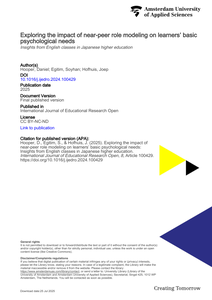In the Self-Determination Theory (SDT) basic psychological needs for relatedness, autonomy and competence are distinguished. Basic psychological need fulfilment is considered to be critical for human development and intrinsic motivation. In the Netherlands, the concept of basic psychological need fulfilment is introduced in the curricula of many teacher education institutes. In five teacher education institutes for primary school teachers, study coaches use a Dutch version of the Basic Psychological Needs Scale (BPNS), to collect data to be used in a discussion with student teachers about their intrinsic motivation for a specific part of the teacher education course. On the basis of the outcomes of this discussion, study coaches and student teachers derive consequences for day to day practice in their classrooms. The data were also used to establish whether the theoretical distinction between three basic psychological needs is found in this sample of student teachers in the Netherlands. The results show that the constructs of relatedness, autonomy and competence are found and can be measured by using a 14-item five-point scale, partly based on the original BPNS, and partly on new items that focus on different sources of perceived need fulfilment, namely teacher education in general, the study coach and fellow students.
DOCUMENT
Although near-peer role modeling (NPRM) has been suggested as an effective pedagogical intervention for boosting confidence, motivation, and self-efficacy, few studies have examined its connection with learner needs and well-being utilizing an established psychological framework. The present study investigates the pedagogical role of NPRM within English classes in Japanese higher education from the perspective of basic psychological need (BPN) satisfaction and frustration. In this two-phase explanatory mixed methods study, two quantitative scales were utilized to assess the significance of the connections between NPRM and six subcategories of BPN satisfaction or frustration. Subsequently, a qualitative investigation with a more limited sample size was conducted to elucidate and expand upon these associations. The quantitative findings revealed NPRM to be a significant predictor of students’ autonomy and relatedness satisfaction and exhibited a negative correlation with students' autonomy and relatedness frustration. However, no discernible association was observed between NPRM and competence satisfaction or frustration. The qualitative data revealed that the students’ mixed feelings of competence may have stemmed from low confidence and L2 self-concept with some students comparing themselves unfavorably to near-peer role models. The study highlights the need for NPRM interventions to be accompanied by instruction related to learner beliefs or growth mindsets.
DOCUMENT

Much research has been done into the relationship between students’ motivation to learn and their basic psychological needs as defined by the self-determination theory (autonomy, competence, relatedness). However, few studies have explored how these psychological needs relate to different types of maladaptive behavior in the classroom. To prevent or remedy such behavior, more insight into its relationships is required. The present study attempted to determine the relationship between maladaptive behavior of secondary school students (grades 8 and 9) and the degree to which both teachers and peers address their needs for competence, autonomy, and relatedness. Results show significant, negative correlations between maladaptive student behavior in the classroom and the extent to which students’ basic psychological needs are met by teachers and fellow students. Both teachers and fellow students play a role in students’ maladaptive behavior toward school and withdrawn behavior. When it comes to unfriendly behavior, the perceived support of teachers appears to be particularly relevant, while the role of peers is an important factor in delinquent behavior.
DOCUMENT
